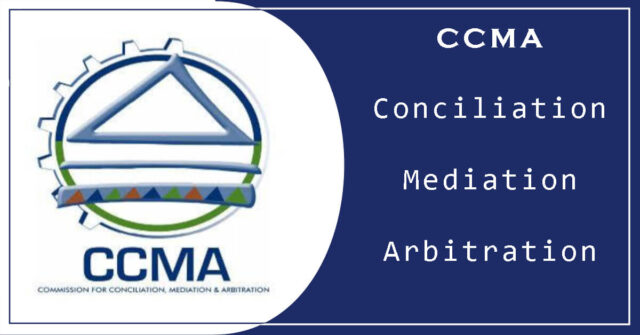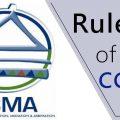The CCMA is a well-known acronym in the South African workplace. Chances are that you have even had some dealings with them in the past on one side or the other. In this article, we take a closer look at the CCMA and try to answer some of the more common questions asked about this commission.
There are links to all the necessary forms required to lodge a complaint and a PDF copy of the CCMA rules for anyone to download if needed. But most importantly we are going to answer questions such as: What is the CCMA? What does the CCMA stand for? How to refer a case to the CCMA. Along with many others.
The Commission for Conciliation, Mediation and Arbitration
History of the CCMA
The 1970s had its fair share of labour issues. Most notably were the Durban strikes in 1973 and the Soweto Uprisings in 1976. The government at the time realised something needed to be done and set up the Wiehahn Commission. This commission was tasked with looking at the current industrial relations system and making recommendations for the future.
The industrial court came into existence on 1 October 1979 following the Wiehahn Commission’s recommendations. The aim of the industrial court was to fairly settle disputes between management and organised labour.
In 1995 the Relations Act 66 (LRA) was passed and with it came the CCMA which replaced the industrial court.
What is the purpose of the CCMA?
Just like the industrial court, the CCMA was tasked with settling disputes between management and labour along with promoting fair practices in the work environment. The CCMA’s main goal is to protect the rights of all parties involved in a labour dispute.
Although not all employers feel that this is always the case.
What does the CCMA stand for?
CCMA stands for the commission for conciliation, mediation and arbitration. This refers to the process of dispute resolution with in the commission.
What is the CCMA?
The CCMA is an independent body that tries to promote fair labour practices and assist with dispute resolution through Mediation and Arbitration. By being an independent body the CCMA is not linked to any political party, business, or trade union.
When a dispute is referred to the CCMA, parties to the dispute should first try to find a common solution that both sides are happy with. This process of “Conciliation” is assisted by a trained mediator who helps parties find this common ground.
Only if the parties to a dispute are unable to find a common solution is the matter referred to arbitration where a decision will be made by a commissioner that both parties will have to abide by.
This is the recommended process, however, there are cases that may be referred directly for arbitration on application.
Who may lodge a complaint?
Any employee or employer involved in a labour dispute may request assistance from the CCMA. As mentioned earlier, ideally you should first request mediation in order to find a common solution. Common disputes referred to the CCMA include:
- Unfair dismissal
- Wage disputes
- Working conditions
- Workplace changes
- Discrimination
How to refer a case to the CCMA.
Below is the process to follow if you would like to refer a case to the CCMA. You can click on the form number below to download a PDF copy of the form.
Step 1:
If you have an issue you need to take action relatively quickly. You have 30 days from the date on which the dispute took place to refer a case. (In the case of discrimination then the period is 6 months)
You will need to complete a CCMA case referral form, LRA Form 7.11, to lodge a dispute.
Step 2:
You need to send a copy of this form to the other party in the dispute. Very importantly you also need to be able to prove that this was delivered to the other person. Keep this proof as you will need it for the next step.
Step 3:
After this, you may submit your case referral form to the CCMA. You can do this in person at your closest CCMA office or simply fax or post it in. Make sure that you include proof the form has been sent to the other party.
Step 4:
The CCMA will set a date for the initial hearing and notify both parties. Unless otherwise requested this will be a mediated hearing. Ideally, some common ground will be found here and the mediator may suggest potential settlement agreements.
No legal representatives should be present during this phase of the process.
Step 5:
If the mediation process is unsuccessful the commissioner will need to issue a certificate to this effect. The matter will be then referred for arbitration, or in extreme circumstances the labour court.
Step 6:
Requesting arbitration involves completing an LRA form 7.13 within 30 days of the initial hearing. Just as in step 2 you need to send a copy to the other party.
This process is more formal and you will be required to present evidence and call witnesses.
You will also be given an opportunity to cross-examine each other and in most cases legal representation is permitted.
Step 7:
The commissioner is responsible for making a decision within 14 days after hearing both sides. This is called the arbitration award and is binding on both parties.
What to do if an employer refuses to comply with an arbitration award.
Although a CCMA award is binding on both parties there are times when an employer may not comply with the award. If an employer does not comply with the terms of an arbitration award it will need to be made an order of the Labour court.
An award can only be enforced when the award has been certified by the CCMA. This can be done by returning to your nearest CCMA office and completing an LRA Form 7.18 (Application to certify award & Writ of Execution.) You will need to attach a copy of the award to this form.
There are no time limits in place to complete this process.
Additional Resources.
Rules of the Commission for Conciliation, Mediation and Arbitration
If you are interested you can find the complete list of rules of the CCMA here, plus a downloadable PDF of the rules.
CCMA Forms (PDF)
LRA Form 7.11
LRA Form 7.13
LRA Form 7.18
LEGAL CONTENT DISCLAIMER
The information contained on this website is simply aimed at providing readers with guidance on labour law in South Africa. This information has not been provided to meet the individual requirements of a specific individual. Bizcraft will always suggest that legal advice be obtained to address a person’s unique circumstances. It is important to remember that the law is constantly changing and although Bizcraft strives to keep the information up to date and of high quality, it cannot be guaranteed that the information will be updated and/or be without errors or omissions. As a result, Bizcraft will under no circumstances accept liability or be held liable, for any innocent or negligent actions or omissions which may result in any harm or liability flowing from the use of or the inability to use the information provided.





January 24, 2024
Hello i want to ask what can i do if a company refuse to pay you